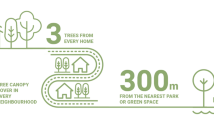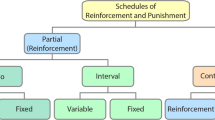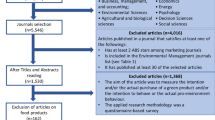Abstract
Misunderstandings in the relative efficacy of pro-environmental behaviors may have important consequences for climate mitigation efforts. In this study, we evaluate the ability to perceive the carbon footprint associated with individual actions, known as “carbon numeracy,” in 965 members of the North American public using ranking and tradeoff questions. The questions are designed to independently assess the role of knowledge, ability to do tradeoffs, and basic numeracy skills in determining carbon numeracy. We report multiple lines of evidence suggesting that people underestimate greenhouse gas emissions associated with air travel and, to a lesser extent, meat consumption. They are also largely incapable of making tradeoffs between different actions (e.g., the number of hamburgers that would be equivalent to a trans-Atlantic flight in terms of climate impact). Concern for climate change, political orientation, and education were not significant predictors of accuracy in making tradeoffs, but basic numeracy was linked with increased accuracy. The results suggest that further education may be necessary to improve carbon numeracy by providing the public with a basic hierarchy of actions according to carbon reduction efficacy. Consumers seeking to balance their carbon budgets may benefit from external aids (e.g., carbon labels associated with actions) to guide emission-related decision-making.



Similar content being viewed by others
References
Attari SZ, DeKay ML, Davidson CI, Bruine de Bruin W (2010) Public perceptions of energy consumption and savings. Proc Natl Acad Sci 107:16054–16059
Camilleri AR, Larrick RP, Hossain S, Patino-Echeverri D (2019) Consumers underestimate the emissions associated with food but are aided by labels. Nat Clim Chang 9:53–58
Capstick S, Whitmarsh L, Nash N, Haggar P, Lord J (2019) Compensatory and catalyzing beliefs: their relationship to pro-environmental behavior and behavioral spillover in seven countries. Front Psychol 10:963–963
Coben D, Colwell D, Macrae S, Boaler J, Brown M, Rhodes V (2003) Adult numeracy: review of research and related literature. National Research and Development Centre for adult literacy and numeracy London
Coley D, Howard M, Winter M (2009) Local food, food miles and carbon emissions: a comparison of farm shop and mass distribution approaches. Food Policy 34:150–155
Cornelius M, Armel KC, Hoffman K, Allen L, Bryson SW, Desai M, Robinson TN (2014) Increasing energy-and greenhouse gas-saving behaviors among adolescents: a school-based cluster-randomized controlled trial. Energy Efficiency 7:217–242
De Boer J, de Witt A, Aiking H (2016) Help the climate, change your diet: a cross-sectional study on how to involve consumers in a transition to a low-carbon society. Appetite 98:19–27
Fox CR, Ratner RK, Lieb DS (2005) How subjective grouping of options influences choice and allocation: diversification bias and the phenomenon of partition dependence. J Exp Psychol Gen 134:538
Gardner GT, Stern PC (2008) The short list: the most effective actions US households can take to curb climate change. Environ Sci Policy Sustain Dev 50:12–25
Gifford R (2011) The dragons of inaction: psychological barriers that limit climate change mitigation and adaptation. Am Psychol 66:290
Grinstein A, Kodra E, Chen S, Sheldon S, Zik O (2018) Carbon innumeracy. PLoS One 13:e0196282
Hope AL, Jones CR, Webb TL, Watson MT, Kaklamanou D (2018) The role of compensatory beliefs in rationalizing environmentally detrimental behaviors. Environ Behav 50:401–425
Hornsey MJ, Harris EA, Bain PG, Fielding KS (2016) Meta-analyses of the determinants and outcomes of belief in climate change. Nat Clim Chang 6:622–626
Ivanova D, Barrett J, Wiedenhofer D, Macura B, Callaghan MW, Creutzig F (2020) Quantifying the potential for climate change mitigation of consumption options. Environ Res Lett
Jones CM, Kammen DM (2011) Quantifying carbon footprint reduction opportunities for US households and communities. Environ Sci Technol 45:4088–4095
Kaklamanou D, Jones CR, Webb TL, Walker SR (2015) Using public transport can make up for flying abroad on holiday: compensatory green beliefs and environmentally significant behavior. Environ Behav 47:184–204
Kause A, de Bruin WB, Millward-Hopkins J, Olsson H (2019) Public perceptions of how to reduce carbon footprints of consumer food choices. Environ Res Lett 14:114005
Kowarik A, Templ M (2016) Imputation with the R package VIM. J Stat Softw 74:1–16
Lacroix K (2018) Comparing the relative mitigation potential of individual pro-environmental behaviors. J Clean Prod 195:1398–1407
Lazzarini GA, Zimmermann J, Visschers VH, Siegrist M (2016) Does environmental friendliness equal healthiness? Swiss consumers’ perception of protein products. Appetite 105:663–673
Marghetis T, Attari SZ, Landy D (2019) Simple interventions can correct misperceptions of home energy use. Nat Energy 4:874–881
Shi J, Visschers VH, Bumann N, Siegrist M (2018) Consumers’ climate-impact estimations of different food products. J Clean Prod 172:1646–1653
Söderberg MW, Wormbs N (2019) Grounded beyond flygskam. European Liberal Forum, Stockholm
Sütterlin B, Siegrist M (2014) The reliance on symbolically significant behavioral attributes when judging energy consumption behaviors. J Environ Psychol 40:259–272
Truelove HB, Parks C (2012) Perceptions of behaviors that cause and mitigate global warming and intentions to perform these behaviors. J Environ Psychol 32:246–259
Truelove HB, Carrico AR, Weber EU, Raimi KT, Vandenbergh MP (2014) Positive and negative spillover of pro-environmental behavior: an integrative review and theoretical framework. Glob Environ Chang 29:127–138
Turrentine TS, Kurani KS (2007) Car buyers and fuel economy? Energy Policy 35:1213–1223
Weber CL, Matthews HS (2008) Food-miles and the relative climate impacts of food choices in the United States. Environ Sci Technol 42:3508–3513
Wynes S, Nicholas K (2017) The climate mitigation gap: education and government recommendations miss the most effective individual actions. Environ Res Lett 12
Wynes S, Nicholas KA (2019) Climate science curricula in Canadian secondary schools focus on human warming, not scientific consensus, impacts or solutions. PLoS One 14:e0218305
Author information
Authors and Affiliations
Corresponding author
Additional information
Publisher’s note
Springer Nature remains neutral with regard to jurisdictional claims in published maps and institutional affiliations.
Electronic supplementary material
ESM 1
(PDF 1024 kb)
Rights and permissions
About this article
Cite this article
Wynes, S., Zhao, J. & Donner, S.D. How well do people understand the climate impact of individual actions?. Climatic Change 162, 1521–1534 (2020). https://doi.org/10.1007/s10584-020-02811-5
Received:
Accepted:
Published:
Issue Date:
DOI: https://doi.org/10.1007/s10584-020-02811-5




